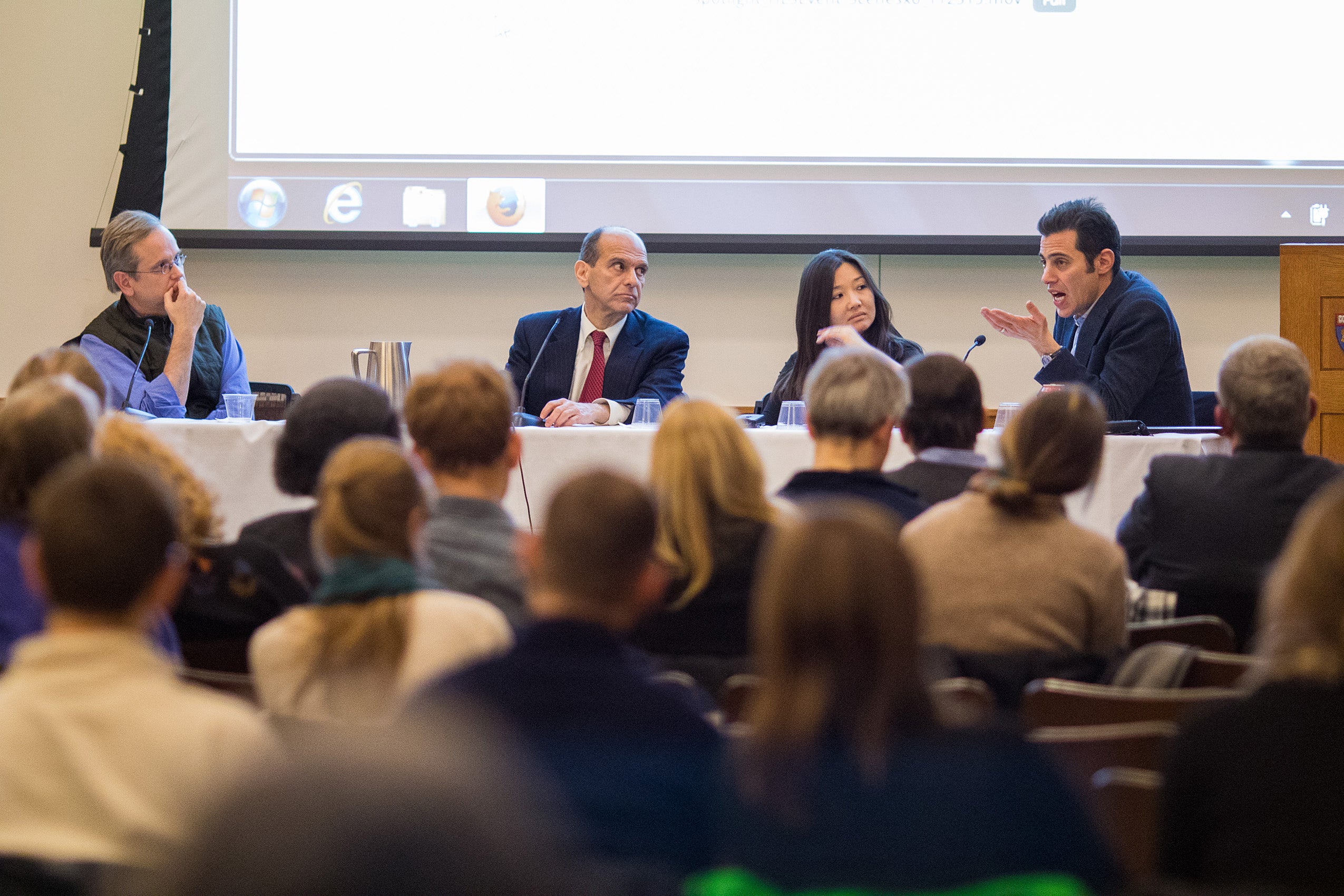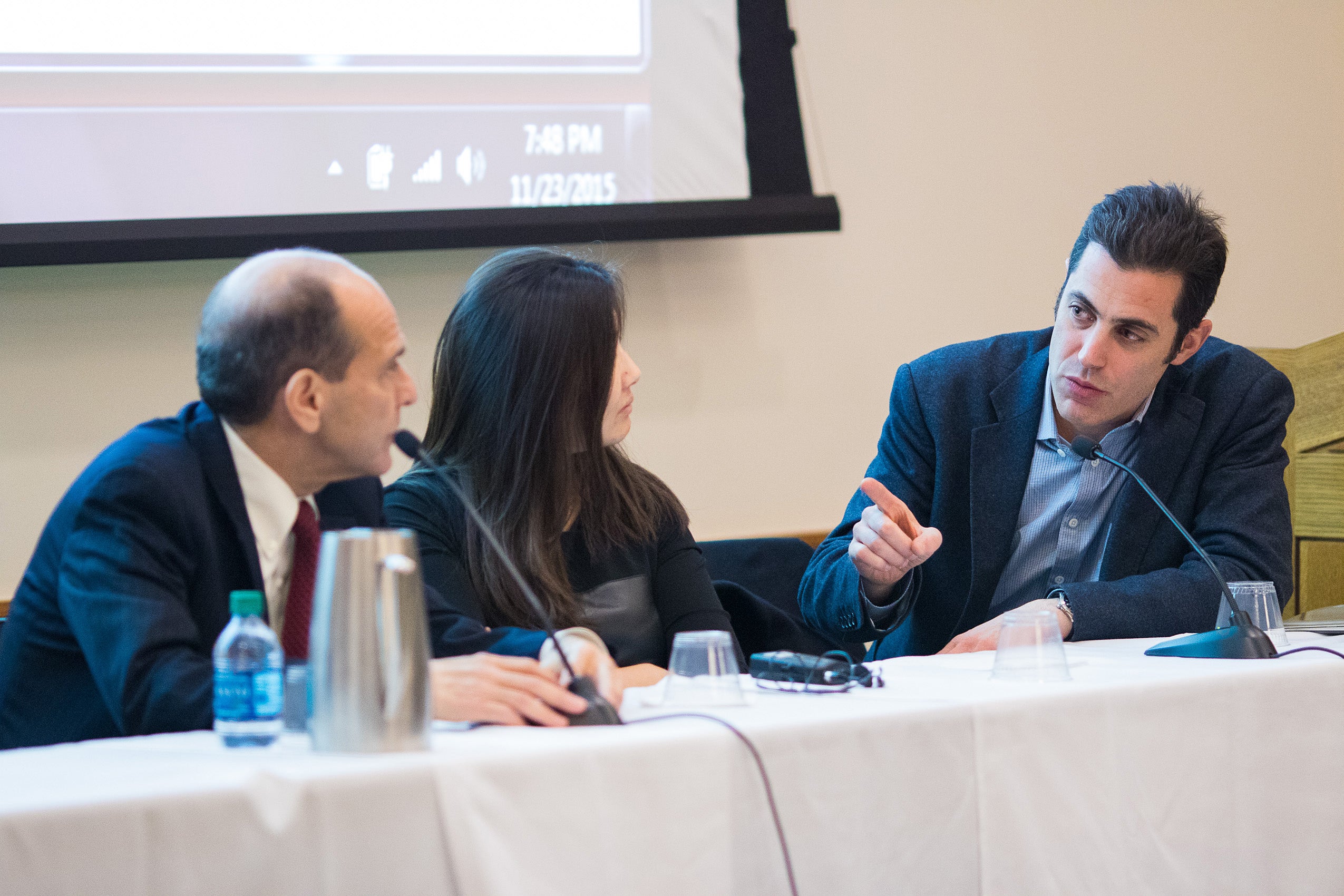
The film “Spotlight” focuses on the dogged pursuit by Boston Globe reporters to expose the Catholic Church’s cover-up of the sexual abuse of children by Boston priests. But there is much more to the story, as evidenced by a wide-ranging panel discussion of the movie last week at Harvard Law School that touched on legal issues, secrets and shame, and even a potential lawsuit against the filmmakers.
Sponsored by the Harvard Law School Library and the Dean of Students Office, the panel featured Josh Singer ’01, who co-wrote the screenplay with director Tom McCarthy; Mitchell Garabedian, who represented dozens of plaintiffs in suits against the church (and was depicted by Stanley Tucci in a prominent role in the movie); and HLS professors Jeannie Suk ’02 and Lawrence Lessig, with Professor Jonathan Zittrain ’95 moderating. In the audience were Ben Bradlee Jr. and Michael Rezendes, journalists from the Globe who were also depicted in the film, and who participated in the discussion.
Singer, whose previous credits include the television series “The West Wing” and the movie “The Fifth Estate,” described the process of creating “Spotlight,” which he began writing in 2012, and the copious research involved, including interviews with victims and Globe reporters. “We wanted to present reporting and the newsroom in a way that really hadn’t been done in many years, as accurately as possible,” he said. “We were pretty extreme in terms of hard work in trying to get the story right.”
“It was the worst-kept secret in Boston that these priests were molesting children. Everybody seemed to know but no one seemed to do anything about it.”
Mitchell Garabedian
After several clips from the movie were shown to the audience in Wasserstein Hall, Garabedian spoke of his interactions with the victims and how the cases helped validate their stories and heal some of the pain they continued to live with in adulthood. Before the victims spoke out and the Globe coverage galvanized attention around the issue, he said, “It was the worst-kept secret in Boston that these priests were molesting children. Everybody seemed to know but no one seemed to do anything about it.”
Lessig, who represented a man in a lawsuit against a boarding school they both attended in New Jersey at which staff committed sexual abuse, said that the movie’s strength is that it considers the culpability of institutions as well as that of criminals. In the case he handled, he said, the institution acknowledged that as many as 70 percent of the students were abused but claimed it was not at fault. “We have to recognize that there are criminals, but then there’s the rest of us who sit by and don’t do anything,” he said.
Another attorney who represented victims in the priest abuse cases, Eric MacLeish, was shown in the movie as privately settling cases with the church on the condition of confidentiality, a practice for which he was vilified onscreen. Garabedian revealed that he advised clients never to sign a confidentiality agreement, since he believed forcing them to remain silent about their abuse would re-victimize them. Suk, who has written extensively on the issue of sexual violence, noted, however, that victims often fear going through the legal system and exposing their cases to the public. “Oftentimes they do not want the publicity associated with that,” she said. “They do not want to be known in the press to be a victim. They don’t want the stigma associated with it, and also having to go through a trial.”
“We have to recognize that there are criminals, but then there’s the rest of us who sit by and don’t do anything.”
Lawrence Lessig

Near the end of the event, Zittrain asked Singer to address a recent Boston Globe column by Kevin Cullen, in which Jack Dunn, a spokesman for Boston College, contended he was misrepresented in one movie scene. Singer, who indicated that Dunn sent a claim letter to the filmmakers, said he stood by the research for the film and that the characterization of Dunn was vetted by the journalists who witnessed the scene that was recreated. “We feel it’s a shame that he’s attempting to shift the focus away from the bigger issues the movie tackles, including the plight of survivors of clergy sex abuse and the Catholic Church’s handling of this sensitive issue,” Singer said.
Victims were a focus for much of the event, including the story Garabedian told of an 89-year-old man still burdened by the trauma of a priest abusing him more than 75 years ago, something he could have never talked about when it happened. Lessig noted that it’s easier today to talk about being abused than it was in decades past. But until society treats abuse as something terrible that happened to someone and not something that defines them, he said, the secrecy will continue.
A recording of the panel made by an audience member is available here.
